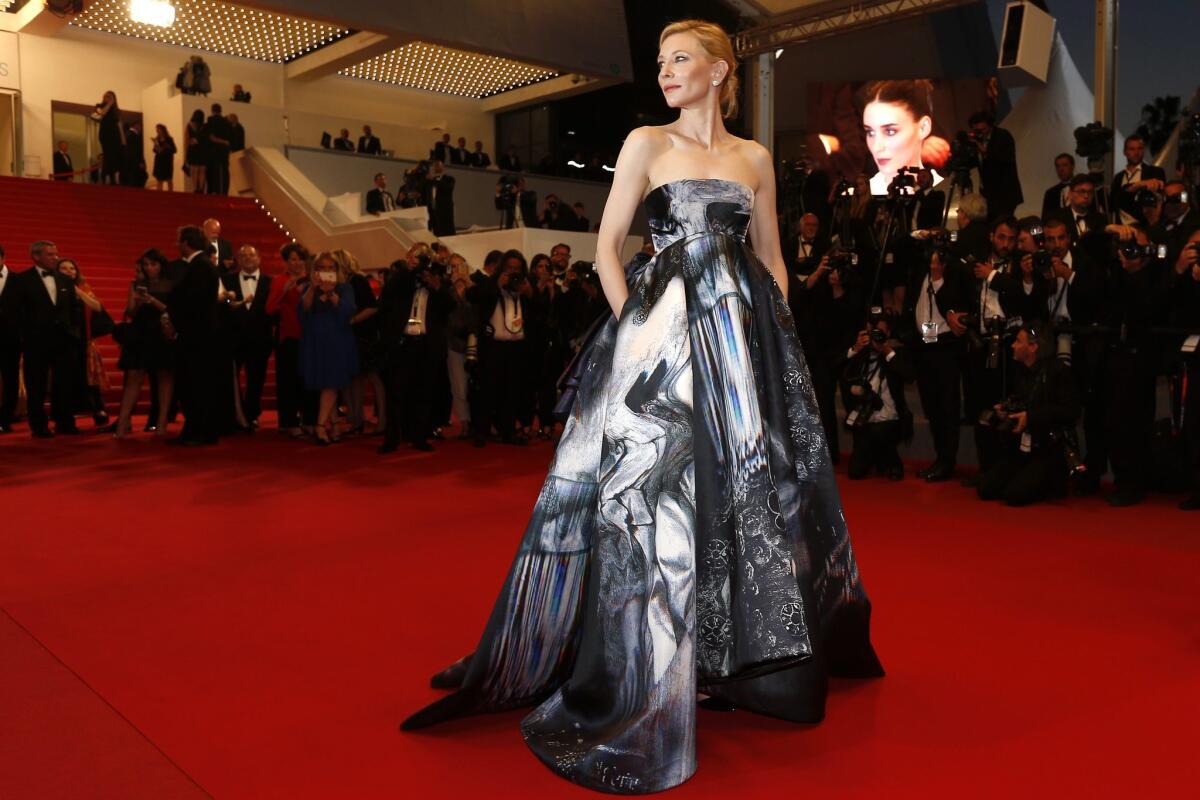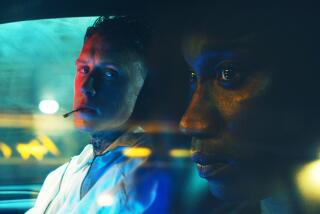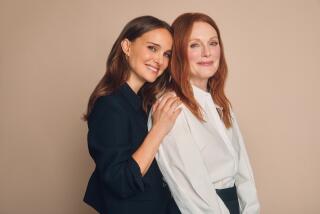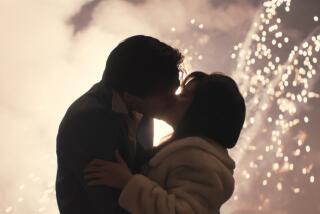Cannes: Cate Blanchett-starring lesbian film ‘Carol’ transcends period

Australian actress
As a lesbian romance set just before the dawn of the Eisenhower era, the new film “Carol” would seem to have little light to throw on modern relationships. In the year the film takes place (1952), at least 28 states still had some form of law forbidding interracial marriage. Gay unions, needless to say, were a galaxy away.
But though awash in unfamiliar mores and fashions, “Carol” — which centers on a relationship between Cate Blanchett’s self-confident Carol and Rooney Mara’s ingenue Therese — can seem as much of the moment as any contemporary romance. In part that’s because it captures the early uncertain tendrils of love well-known to pretty much every human being. And in part it’s because it seeks to capture the spirit of romance in the face of pressures from those around you, a subject that doesn’t know from cultural norms.
“It’s a film that feels transgressive and boundary-pushing,” Blanchett said in an interview, “even though it’s set in this other time, in this hermetic world.”
Blanchett was in a rooftop lounge Monday at the Cannes Film Festival, speaking in a joint interview with Mara. The two had just been through the gamut of experiences this gathering can offer — a warmly received critics screening Saturday, a very enthusiastic gala premiere Sunday and, to top it off, a tabloid-y kerfuffle about Blanchett’s own remarks on past relationships with women. Cannes can do high and low.
The pair on this afternoon was interested in talking about the film, and for understandable reasons.
Directed by Todd Haynes from a novel by Patricia Highsmith (originally titled ”The Price of Salt”), “Carol” arrives after a 15-year gestation period, in which it seemed at times to be destined for the great-unproduced-novels pile. But the British production company Film4 stuck with it, as did the actors. And not too long after Haynes came on, the project gained momentum with Film4 and Goldcrest financing. (The Weinstein Co. will release it in the U.S. later this year.)
With a directorial style as tightly controlled as the period it covers, “Carol” tells of what happens when Therese, a junior-level department-store worker, has a chance run-in with Carol, an upper-class bisexual woman living amid the embers of a failed marriage, during one holiday season in New York.
Their courtship is slow, to say the least, a function of a young Therese unsure of how to sort out her feelings as much as it is the repressive time in which she lives. It’s the kind of story in which the first intimate contact doesn’t come until nearly an hour into the movie, and even then unfolds with a strong measure of restraint. The movie’s cool politesse belies the subversive nature of the main characters’ actions. Rather than turn Carol and Therese into lash-out-loud rebels, Haynes shows them carrying out their romance in the subdued tones of their time.
As a result, the audience is left to puzzle out motivations themselves instead of digesting what’s been handed to them; we infer consequences from actions and feelings from intimations. “Carol” is a film understood primarily through its silences.
“There’s no reference point, no movie or example, for these two women to make sense of how they feel,” Haynes said in an interview. So they can’t articulate it and have to just feel their way through it.” And, after all, he said, “Isn’t how most of us feel in a relationship?”
Added Blanchett: “In life we don’t always know why we do what we do — particularly when it comes to sexual urges — and only make sense of it when we reflect on it later.” Mara, for her part, said the silences were a particular type of acting challenge—“I did wonder how I could do it, until I got to the set and realized the world that was being created.”
Playing the role with a kind of take-charge demeanor and the slightest hints of fragility, Blanchett returns to the period drama genre — “Elizabeth,” “The Aviator” — that have staked her career. So does Haynes, whose “Far From Heaven” 13 years ago offered the male side of the 1950s forbidden-love equation.
“I think it gave me more pause than it did inspire me to do this,” Haynes said when asked how his making that movie affected his choice to do this one. “But as I got into it I realized they were very different periods. There was that film [set in the late 1950s] and this one, in the early 1950s, which was a time really about the complexity of the end of the 1940s and life after World War II.”
On the matter of Blanchett’s past relationships — the actress was quoted in a pre-fest interview as suggesting she had sexual relationships with women, then walked it back in a festival press conference — Blanchett laughed and waved the whole fracas aside on Monday.
“I enjoyed talking to that journalist. So I don’t actually think it’s the original piece,” she said (a slight divergence from the press conference, in which she took a poke at the story for saying it left out her qualification the relationships weren’t sexual). “It’s the way it gets picked up and picked up and reprinted. It becomes writing on the back of the bathroom wall. And I don’t have interest in reading the writing on the back of the bathroom wall.”
She then laughed again and said. “And who cares? I mean, really, who cares? I have better things to do than worry about what people think of my sexuality.”
Haynes had his own take. Chuckling good-naturedly at the whole affair, he said he thought the stir over Blanchett’s sexuality was as much about “hunger and thirst for gossip about celebrities, an instinctive, sometimes prurient need that goes back to Shakespeare,” as it was a sign of intolerance or fetishization.
Plus, he said, he didn’t think the fuss was much to do with lesbianism per se. “The idea of Cate Blanchett having sex with anybody is going to be interesting to a lot of people.”
These superficial issues might be less in the conversation when the movie hits later in the year. “Carol” will generate awards chatter all around, including for Blanchett, a six-time nominee who won best actress just last year (though whether she and Mara will both be in the lead category is an open question).
Directors and actors likely aren’t the only people to garner attention. Screenwriter Phyllis Nagy went for a rigorous minimalism in the script, always a vault off the high board. She also avoided the first-person perspective Highsmith offered with Therese in the novel, a pitfall not circumvented by many adaptations.
She did reproduce a number of key moments in the book — including the well-known line if it’s “an attractive price,” uttered by Therese as a coy way of suggesting they should share a motel room — and also took some liberties with new dialogue. (Notable: “Just when things couldn’t get any worse, I run out of cigarettes,” Carol says.)
Though films set in morally restrictive periods can flatter their audiences — essentially, “I feel good about myself watching this movie because I would never act as the characters do — “Carol” rarely succumbs. In fact, you’re less likely as a viewer to feel smug about our current time than you are to admire the genuine quandary of the protagonists in theirs.
And there is much to gaze at. For all of Carol’s dominant qualities, few moments pass without a flash of humanity. Said Blanchett: “I wanted to maintain a sense of vulnerability. I needed to do things that still made Carol available to the audience.”
Twitter: @ZeitchikLAT
More to Read
Only good movies
Get the Indie Focus newsletter, Mark Olsen's weekly guide to the world of cinema.
You may occasionally receive promotional content from the Los Angeles Times.







